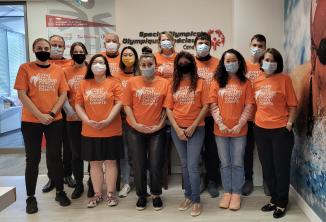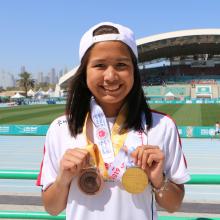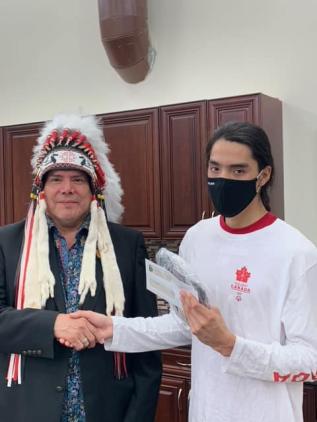Today marks Canada’s first National Day for Truth and Reconciliation.
On this day, we recognize the painful history and impacts of the residential school system, particularly in light of the discoveries of unmarked grave sites at former residential school locations this year. It’s a time to forward our reconciliation efforts to build a better future for all Canadians.
Reconciliation is the process of healing relationships between Indigenous and non-Indigenous Canadians, which requires public truth sharing and commemoration that acknowledges and amends past and present harms.
We all have a role to play in the ongoing commitment to Truth and Reconciliation. Special Olympics Canada encourages all athletes, coaches, volunteers, staff and supporters in our community to honour the National Day for Truth and Reconciliation, whether through personal reflection or education and awareness activities.
Orange Shirt Day
Both the National Day for Truth and Reconciliation and Orange Shirt Day take place on September 30.
Orange Shirt Day is an Indigenous-led grassroots commemorative day intended to raise awareness of the individual, family and community inter-generational impacts of residential schools, and to promote the concept of “Every Child Matters”. The orange shirt is a symbol of the stripping away of culture, freedom and self-esteem experienced by Indigenous children over generations. This day relates to the experience of Phyllis Webstad, a Northern Secwpemc (Shuswap) from the Stswecem'c Xgat'tem First Nation, on her first day of school, where she arrived dressed in a new orange shirt, which was taken from her.
On September 30, we encourage all Canadians to wear orange to raise awareness of the tragic legacy of residential schools, and to honour the thousands of Survivors.
Celebrating Special Olympics Athletes with Indigenous Heritage
This National Day for Truth and Reconciliation – and all year long – we celebrate the inspiring achievements of Special Olympics athletes across Canada with Indigenous heritage.
Meet Arianna Phillips
Arianna is Snuneymuxw and Teeshaht and is a member of Snuneymuxw First Nations. She is also a multi-sport athlete known for her passionate pursuit of personal bests.
It all started with Tee-Ball and figure skating at 4-years-old. Now 18, Arianna has traveled the globe and has brought home gold, silver and bronze medals from competition at the provincial, national and world stage.
"Special Olympics gives athletes like me a chance to do our best, at our own personal level. When I beat my personal best, I collapsed to the ground with tears because I was so happy," Arianna shares.
Watch Arianna's Highlight Reel
Meet William Hart
William is originally from The Nisichawayasihk Cree Nation but lives in Thompson, Manitoba. He and his
twin sister Jemiha have both been Special Olympics since they were 7 years old. He started off with swimming, then went to figure skating, and most recently qualified for Special Olympics Team Canada 2022 for alpine skiing.
At the Special Olympics Team Canada 2022 Training Camp Weekend, William delivered a land acknowledgment and shared a message with his team members:
“I would like to share a special moment from the last 2 years. I realize many people – even people you don’t know – are supportive of Indigenous athletes. People want to see me achieve my dreams. While I was preparing for World Games, Manitoba Keewatinowi Okimakanak Grand Chief Garrison Settee invited me to the Imperial Office and addressed me as a great Warrior. He stated ‘We believe in your dream, we believe in your vision, and we believe in your goal… you are truly a warrior and I am very proud of you.’ He wore a traditional headdress and presented me with a gift. I felt very special and proud to have my own First Nations people so supportive of me as I worked toward achieving my dreams as a member of Special Olympics Team Canada 2022. During the last two years, we have had many challenges. Each obstacle we have encountered made us better and stronger – no matter our race, culture, religion or who we are.”
More Information and Resources:
Start your learning journey here by exploring more about the rich and diverse cultures, voices, experiences and histories of First Nations, Inuit and Métis Peoples.
INDIGENOUS PEOPLES AND CULTURES
Learn about the unique history, languages, cultural practices, and spiritual beliefs of Indigenous peoples in Canada.
Indigenous history in Canada
Learn more about the contributions of Indigenous peoples from the Royal Proclamation of 1763 through the world wars to today.
Remembering the children
A 1-hour national commemorative gathering will be broadcast live from Ottawa’s LeBreton Flats on September 30, 2022. Check your local listings.



